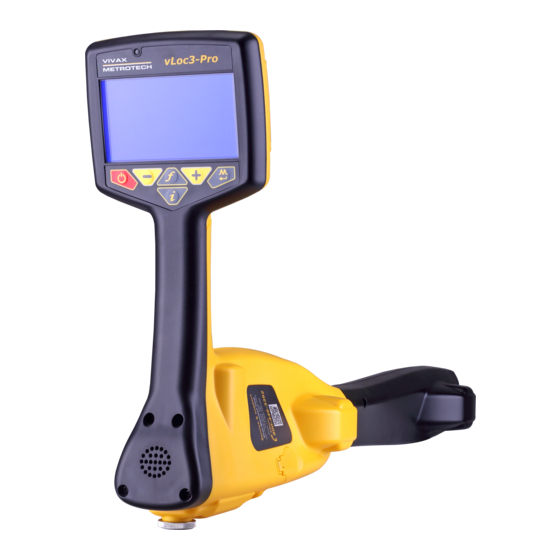
Vivax Metrotech vLoc3 Series User Manual
Remote antenna
Hide thumbs
Also See for vLoc3 Series:
- User handbook manual (68 pages) ,
- User manual (4 pages) ,
- Quick manual (4 pages)
Summary of Contents for Vivax Metrotech vLoc3 Series
- Page 1 Series Remote Antenna User Guide (English Edition) Version 1.2 P/N: 4.04.000124...
-
Page 3: Table Of Contents
Table of Contents 1. vLoc3 Remote Antenna Introduction................1 2. Standard Operation - 512Hz to 200kHz..............1 2.1 Applying the transmitter Signal................1 2.2 Identifying a cable with the remote antenna............2 2.3 Enhancing the loopback method of cable identification........3 3. Using the SD Signal....................4 3.1 Performing a remote antenna SD reset...............5 3.2 Identifying a cable with SD mode................6 3.3 Enhancing the loopback method of cable identification with the aid of the SD... -
Page 5: Vloc3 Remote Antenna Introduction
The remote stethoscope antenna is a useful tool to help identify cables. However, it should not be used as identification before an unused cable is cut. Always follow company procedures when cutting disused or isolated cables. The vLoc3 Series Keypad On/Off button Reduce sensitivity Select frequency... -
Page 6: Identifying A Cable With The Remote Antenna
When using the signal clamp, both ends of the target cable should be grounded. Apply the clamp below the ground point. Applying the clamp above the ground point will prevent the signal from finding the return path through the ground, so it is not advised. Note: Applying the SiS or SD signals requires the use of the SiS Signal clamp. -
Page 7: Enhancing The Loopback Method Of Cable Identification
59.6 120dB 512Hz Note the strongest signal as displayed on the bar graph in conjunction with the dB gain setting. The strongest signal will indicate the probable target cable. The remote antenna stethoscope can be used to help identify disused and isolated cables. This process can be further enhanced if the cable is isolated and is of twisted cable construction. -
Page 8: Using The Sd Signal
3. Using the SD Signal The Remote Antenna is also capable of detecting SD signals. Apply the signal using the direct connection method. Remember to isolate the cable beforehand, as below. It is also preferable to use the ground stake as an independent ground. -
Page 9: Performing A Remote Antenna Sd Reset
49.0 87dB SD-EUR 3.1 Performing a remote antenna SD reset Connect the transmitter to the service to be identified, place the antenna on the red cable as previously described with the label pointing away from the transmitter. Press the "i" button. -
Page 10: Identifying A Cable With Sd Mode
3.2 Identifying a cable with SD mode Having confirmed that the antenna is synchronized with the receiver, proceed to the cable's location to be identified. Place the antenna on each of the suspected cables, in turn, ensuring the correct orientation, i.e., the arrow on the antenna pointing away from the transmitter. -
Page 11: Performing A Remote Antenna Sis Reset
Select an SIS signal from the transmitter (there are many available, but lower frequencies will create less bleed off to other lines, SiS 491Hz is a good frequency to start with). Connect the remote antenna and place it on the red transmitter lead. Place it with the arrow on the remote antenna, pointing away from the transmitter. -
Page 12: Identifying A Cable Using Sis
Now press the "Enter" key. The screen should now show something similar to the below with the "+" icon showing little or no red shown in the distortion indicator. 52.1 25dB SiS8440 The system is now ready to identify the cable at the location of interest. Note that the SiS reset will revert to the default setting if the vLoc3 is switched off. -
Page 13: Enhancing The Loopback Method Of Cable Identification Using The Sis Signal
4.3 Enhancing the loopback method of cable identification using the SIS signal As described before, a more reliable method of loop backing the signal on the cable is possible if the cable is out of service. This method can be further enhanced with the aid of the SIS signal. - Page 14 Vivax-Metrotech Corp. (Headquarters) 3251 Olcott Street, Santa Clara, CA 95054, USA T/Free: 1-800-446-3392 Tel: +1-408-734-1400 Fax: +1-408-734-1415 Email: SalesUSA@vxmt.com Website: www.vivax-metrotech.com Visit us at www.vivax-metrotech.com to view our full product line and worldwide locations. Page 10 ™...








Need help?
Do you have a question about the vLoc3 Series and is the answer not in the manual?
Questions and answers